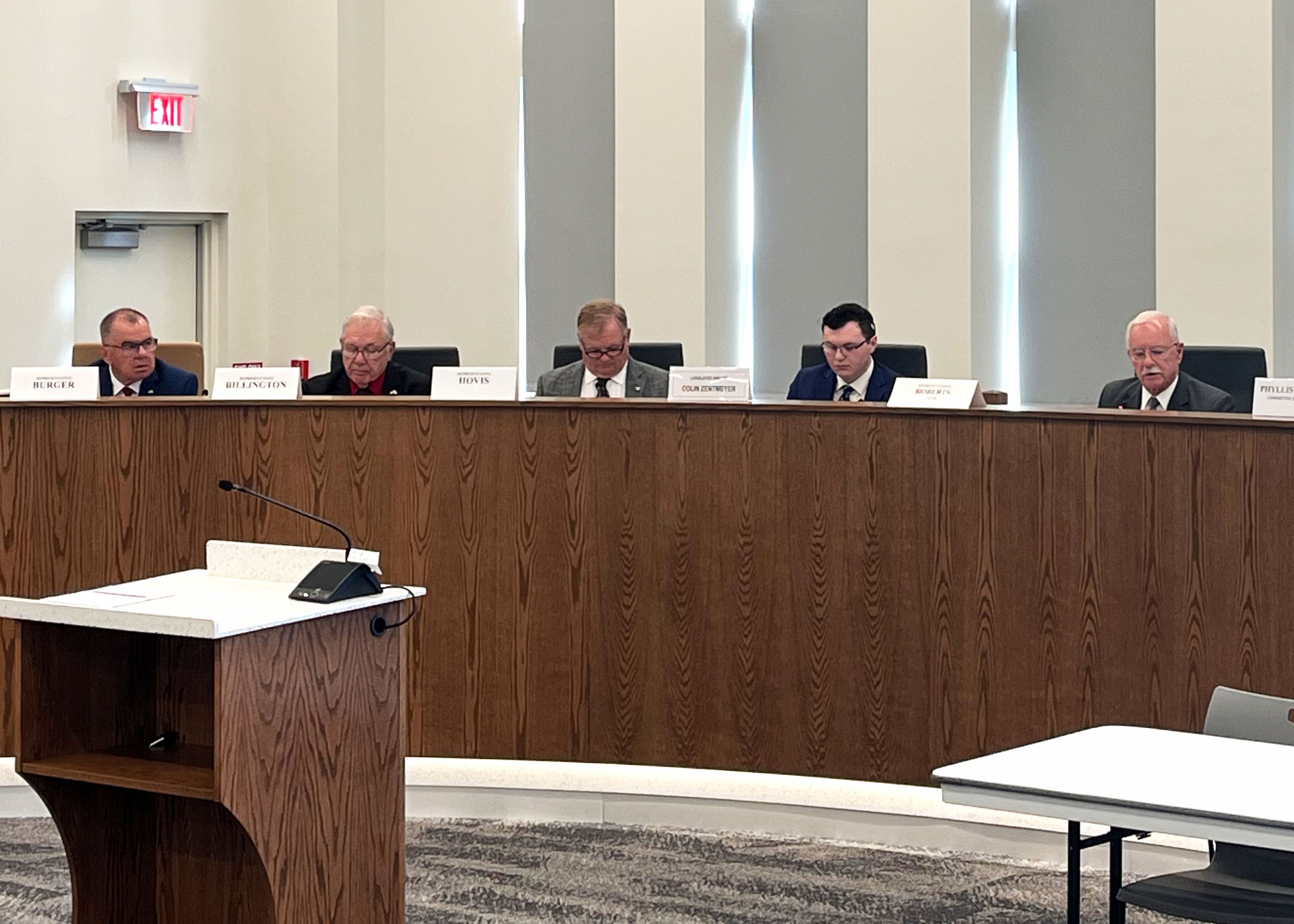Missouri committee wraps up hearings on immigration and crime issues in Cape Girardeau
Missouri's House Special Interim Committee on Illegal Immigrant Crimes concluded its hearings in Cape Girardeau, discussing immigration's impact on crime. Community members voiced concerns and suggestions, focusing on crime mitigation.
Missouri state representatives on the House Special Interim Committee on Illegal Immigrant Crimes held their final hearing out of six Wednesday, Sept. 25, at the Cape Girardeau City Hall council chambers. Seven community members testified, asked questions and offered suggestions on how to combat the illegal immigrant crime issue.
The committee held hearings July 11 in Jefferson City, July 30 in Springfield, July 31 in Joplin, Aug. 13 in Kansas City and Sept. 3 in St. Louis before Wednesday’s hearing in Cape Girardeau. Local representatives and committee members Jamie Burger (R - District 148) and Barry Hovis (R - District 146) were among the nine members in attendance.
Committee chair Lane Roberts (R - District 161) opened the hearing by expressing how he believes the committee’s name is “misleading” and how the intent is to combat crime overall.
“We have spent probably half of each meeting with people testifying for the purpose of defending immigration. Again, that is not the focus of the meeting,” Roberts said. “There are some things that we need to know. We do know that there is a border problem and that a lot of people are coming into our country illegally. We know that embedded among those people are often some very bad people. We know that. We know that there’s an axis between those activities and some of the illegal substances coming into our country.
“What we don't know is whether or not the crime activity is prevalent or is anecdotal to another problem. What we should be doing, what we could be doing is trying to quantify how that's affecting our state. We will not solve the border crisis. In terms of what we can do, I hope, is find ways to mitigate the effects to the benefit of Missouri citizens.”
Those who testified covered topics ranging from the need to put United States and Missouri residents first, to whether the federal government is paying property owners to house illegal immigrants, to potentially taking legal action against the federal government for crimes committed by undocumented immigrants in the state.
“If (a crime) was done by anybody coming here illegally through the border that doesn't belong here, they have to pay for the crime, and the feds have to pay for it regardless,” Sylvio Ortiz said during his testimony. “I mean, why not? They are using our own tax dollars against us. Why not let them flip the bill?”
Del Taylor (D - District 84) responded to Ortiz’s comments, saying it wouldn’t be so easy to round up every undocumented immigrant and ship them back to the southern border on the federal government’s dime.
“I think you and most folks here recognize that these are far more complex issues than simply rounding up 70,000 people,” Taylor said. “But also recognize that most of them — you go around St. Louis and you don't see them standing in unemployment lines — they are the ones working. They're working at our restaurants. They're working at our gas stations. This body has heard numerous testimony that these individuals are here, they’re working and they get tax identification numbers.
“They are working, they are paying taxes and they don't get many of the benefits that you and I get. Simply saying that we should start billing this back to the United States government, what this body has been hearing is that those individuals are here working and they're paying taxes.”
Sara Sommers, who also testified in front of the committee, said her main concern was tracking down the gangs trafficking drugs and minors into the country, even suggesting capital punishment.
“If you want a suggestion, pass the death penalty for fentanyl dealers and put them on death row. That's how I feel about them,” Sommers said. “Maybe life in prison without chance of parole for those that are trafficking minors, because these are the people that they're not getting fingerprinted. You get them arrested and you don't even know who you have. You don't know how many times they've come across the border, because they've never been documented. They don't intend to get a job and pay taxes, they're going to break the law in everything that they do.”
Cape Girardeau County Sheriff Ruth Ann Dickerson was recognized as being in the audience by the committee and was asked to answer some of the member’s questions. While Dickerson said crime caused by illegal immigrants hasn’t been much of an issue in Cape Girardeau County, she explained the drug problems the community faces and how, when dealing with both documented and undocumented immigrants, cultural differences and language barriers make the job more difficult.
“A lot of our inmates, even if that's not the crime they're in there for, I would say drugs are going to be the root of a lot of the problems,” Dickerson said.
David Casteel (R - District 97) dug deeper into the fentanyl issue, asking how long it had been a problem in the area. Dickerson said she had noticed an increase in fentanyl-related drug crimes in the past three to five years but noted methamphetamine-related crimes have decreased.
“We haven't seen that as prevalent here recently, in the last several months,” Dickerson said. “We've seen a little bit of uptick on the cocaine side, but mostly fentanyl.”
While much of the discussion surrounded illegal immigration, Hovis clarified that the committee has a positive outlook on immigration, so long as it's done legally.
“From this committee's perspective, no one is against legal immigration or people coming here that went through the process,” Hovis said. “I think that's a healthy thing for our country. The problem that we have is that many people are being told in other areas if you just get to the U.S., you can stay. When they hear those things from various groups out there, they'll make that journey, because it may not be as good of circumstances where they're from.”
The 25-person committee, composed of 17 Republican and eight Democratic state representatives, was established by Missouri House Speaker Dean Plocher (R - District 89) on July 2, to get constituents’ input on how to tackle the “illegal immigration crisis” and the “crime that’s inflicting our state.”
“The message needs to be, ‘If you’re not here in the State of Missouri legally, you are going to be detained and you are going to be deported, if you’re committing crimes,’” Plocher said during a news conference announcing the committee’s creation. “Particularly the heinous crimes that our citizens are afflicted with.”
Connect with the Southeast Missourian Newsroom:
For corrections to this story or other insights for the editor, click here. To submit a letter to the editor, click here. To learn about the Southeast Missourian’s AI Policy, click here.











